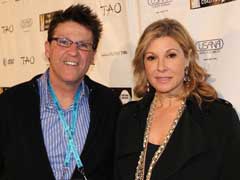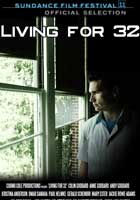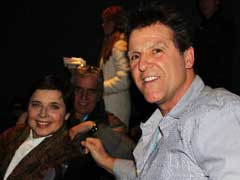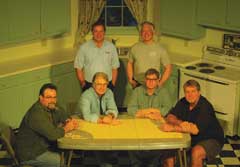Director Kevin Breslin discusses his new documentary Living for 32, the eerie timeliness of its release, gun regulation in the United States, and the courage of Colin Goddard.
 Living for 32 is the inspirational story of Colin Goddard, a survivor of the massacre at Virginia Tech that rocked the nation in April of 2007. Recent events have cast new attention on that terrible day, as Americans struggle to heal, once again, in the aftermath of last month’s tragic shootings in Tucson. The uncanny timing of the documentary’s release is certainly not lost on its creators, who might have preferred that their work go unnoticed than be thrust into the limelight by this confluence of art and life.
Living for 32 is the inspirational story of Colin Goddard, a survivor of the massacre at Virginia Tech that rocked the nation in April of 2007. Recent events have cast new attention on that terrible day, as Americans struggle to heal, once again, in the aftermath of last month’s tragic shootings in Tucson. The uncanny timing of the documentary’s release is certainly not lost on its creators, who might have preferred that their work go unnoticed than be thrust into the limelight by this confluence of art and life.
Be that as it may, the makers of Living for 32 are proud of their film, and rightly so. More important, they believe it may now be better poised to make a real difference in the way guns are regulated in this country.
Director Kevlin Breslin, son of legendary journalist and author Jimmy Breslin, will be bringing Living for 32 to Beaufort to be screened at BIFF, accompanied by the film’s producer, Maria Cuomo-Cole (daughter of Mario Cuomo) and Colin Goddard, its “star.” (Yes, I’m shamelessly name-dropping, here. Wouldn’t you?) Breslin was kind enough to chat with me, via email, from the Sundance Film Festival, where Living for 32 premiered last week.
(That’s right… I said “Sundance.” As in Robert Redford. Couldn’t resist.)
Margaret Evans: Was Colin Goddard always the focus of this documentary, or did you set out to make a documentary about the Virginia Tech massacre, only to have that focus evolve over time?
Kevin Breslin: Colin was always the guts of the story. It took courage for him to say, ‘Yes, I’ll tell you about being shot while sitting in French class.’ I knew his story was personal and relevant. Relevant, because he is alive. He survived the horror of a classroom firefight and ended up with 32 dead all around him.
Even now, Colin is faced with obstacles everyday. The pain of reading about Arizona and the Giffords shooting. This affected him. The struggle to get politicians to understand that we do need better background checks. Colin is a young man. Colin was shot at 21. He just turned 25. He’s lived a whole lifetime, and now he’s had the courage to stand up and address what happened to him at such a young age. He went to school to learn, not to be shot.
shooting. This affected him. The struggle to get politicians to understand that we do need better background checks. Colin is a young man. Colin was shot at 21. He just turned 25. He’s lived a whole lifetime, and now he’s had the courage to stand up and address what happened to him at such a young age. He went to school to learn, not to be shot.
ME: In the film, Colin comes across as someone who has ‘learned.’ He seems wise and circumspect beyond his years. What else struck you about this young man when you began working with him?
KB: Colin is a humanitarian of the highest order, but he is no pushover. This was clear during the filming. Colin does not play the victim. He will not be labeled “the kid who was shot many times at Virginia Tech.” Also, Colin is not a rash young man. He does not allow himself to be rushed or cajoled, but is deliberate and uniquely steady in his views. When he speaks publicly, it’s hard to ignore him or dismiss him. He looks you in the eye, and there is no confusion about Colin Goddard. Still, he hasn’t lost his zest for fun. He smiles a lot for a guy who has so many bullet holes in him. There may be a lesson there.
ME: What is Colin doing now that he’s graduated?
KB: Colin is a young man on the move. He’s working full time for the Brady organization, helping them in their efforts to achieve some sensible background checks in America. He speaks at colleges all over the country. Also, he is very involved in promoting this film. Living for 32 is Colin’s story. It wasn’t easy for him to tell.
ME: Can you tell me a little bit about the process? How did you draw him out?
KB: Going back in your mind and reliving a massacre is not easy. As the director, I was sensitive to this reality. The talk of guns and bullets and blood and death can be very hard on the emotions. Colin lived through this.
I got my cameras in position and he trusted me. And he exposed his soul. We didn’t do many takes. Honesty at this level of story telling gets real quiet and precise. He spoke about forgiving the killer Cho. This stunned me. Colin never pounded his fist. He never even gets mad at the people who call him a coward, a gutless guy who should have had a gun. Colin has such depth he forgives them for their cheap talk.
ME: You’ve worked as an actor, a producer, a playwright and a director of small films and commercials. As a director, does shooting “real people” present challenges that you don’t have when shooting actors?
KB: Yes. Actors are trained to work in any situation. They can work alone and tell a story or play a part. John Huston said – and many of the greats agree – that most actors don’t need to be directed. As for “real people,” again, it’s about creating trust. I love people and it shows. I can speak with anyone. I am interested in their lives and who they are, what they do. It’s important to care. People know if you are insincere. I look them in the eyes. I say hello to them… and then we begin the journey of telling their story. I try not to make a deal out of the cameras. Of course, that is a different part of directing, and that’s covered with the cinematographer.
ME: Speaking of which… I love the way your film is shot. It’s very compelling, visually. I was struck by the lyrical images of the campus, its buildings and gardens, etc… For me, this emphasis on the idyllic beauty of the place really highlights the horror of what happened there. Was that your intention?
 KB: Yes, in researching the film, all I could think about was the irony. Look at this hallowed institution. Virginia Tech, so beautiful. The mountains… the old buildings… all the history. Then, there is classic Norris Hall. You look at it and think, “Wow, 32 people were slaughtered in there.” This created a dramatic visual tension. The beauty against the tragedy and pain of Colin’s words. It makes the event seem even more senseless. Violence erupts at any time, anywhere. That’s also why I used the flag in certain shots. This is our nation. This shouldn’t happen. Cho, like Loughner, had no business getting a gun. In the future I hope all Americans, regardless of their politics, do their best to deter the dangerous from getting guns. It is all in the background laws and policing of those laws.
KB: Yes, in researching the film, all I could think about was the irony. Look at this hallowed institution. Virginia Tech, so beautiful. The mountains… the old buildings… all the history. Then, there is classic Norris Hall. You look at it and think, “Wow, 32 people were slaughtered in there.” This created a dramatic visual tension. The beauty against the tragedy and pain of Colin’s words. It makes the event seem even more senseless. Violence erupts at any time, anywhere. That’s also why I used the flag in certain shots. This is our nation. This shouldn’t happen. Cho, like Loughner, had no business getting a gun. In the future I hope all Americans, regardless of their politics, do their best to deter the dangerous from getting guns. It is all in the background laws and policing of those laws.
ME: The recent tragedy in Tucson lends a timely relevance to your film. Do you have hopes that this uncanny convergence of art and life might lead to some real gun law reform in Washington?
KB: Yes, all the people in Congress got a wakeup call. A nine year old died at a political event! They now realize: this could be any of us. The killer was deranged. He had a litany of emotional and criminal and educational issues against him. And he had a weapon. Whatever you think about guns, we all agree that Loughner should not have had access. This is not about second amendment rights. This is about living together as human beings. A child died! And so did many more. For what???
ME: Sounds like you’ve really taken the cause to heart. Such passion is probably in your DNA, given that your father is the famous journalist/author Jimmy Breslin. How big an influence has he had on your creative life and career?
KB: My dad’s a tough New Yorker. But he’s very gentle with someone who has a story to tell. I think I learned from him the basics of what a story is. I know the hard realities of journalism and writing because of him. I learned that telling a story is a job. Go to work and give it 110%. That is the game. Find a good story – like Colin Goddard in Living for 32 – and work like hell.






